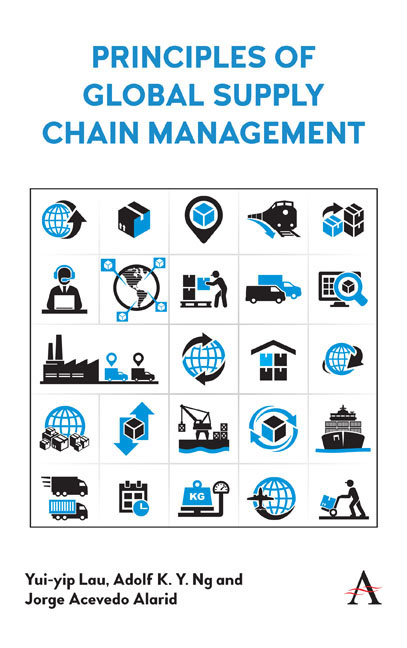Book contents
- Frontmatter
- Contents
- List of Figures
- List of Tables
- Foreword
- Preface
- About the Authors
- 1 Introduction
- 2 Managing Outbound Logistics and Distribution
- 3 Supplier Selection and Procurement
- 4 Warehouse Management
- 5 Case Studies in Food Supply Chains
- 6 Inland Ports in Global Supply Chains
- 7 Climate Change in a Global Environment
- 8 Sustainability in Infrastructure-Based Supply Chains
- 9 Reverse Logistics
- 10 Logistics Associations
- 11 Logistics Education
- 12 Case Exercises in Global Supply Chains
- Appendix
- Index
5 - Case Studies in Food Supply Chains
- Frontmatter
- Contents
- List of Figures
- List of Tables
- Foreword
- Preface
- About the Authors
- 1 Introduction
- 2 Managing Outbound Logistics and Distribution
- 3 Supplier Selection and Procurement
- 4 Warehouse Management
- 5 Case Studies in Food Supply Chains
- 6 Inland Ports in Global Supply Chains
- 7 Climate Change in a Global Environment
- 8 Sustainability in Infrastructure-Based Supply Chains
- 9 Reverse Logistics
- 10 Logistics Associations
- 11 Logistics Education
- 12 Case Exercises in Global Supply Chains
- Appendix
- Index
Summary
In this chapter, we will be providing two specific case studies on food supply chains. Halal food and wine are the two main emerging issues in food supply chains. Recently, the market for halal food has received much attention worldwide. Therefore, the demand for halal food is increasing tremendously. Additionally, a cold chain involves the transportation of temperature- sensitive products along a supply chain through thermal and refrigerated packaging methods and the logistical planning to protect the integrity of these shipments. Wine is a typical example to illustrate such a chain. Thanks to globalization, wine has become one of the important commodities in the global trading activities of the twenty- first century. In this chapter, we will achieve the following objectives:
• provide an overview of halal food market and wine market in different parts of the world;
• explain halal food and wine supply chain management (SCM); and
• analyze how to strengthen the Hong Kong halal food and wine supply chain in the Asia- Pacific regions.
Principles of Halal Food
Halal is an Arabic word that in English is translated as allowed, permitted, legal or lawful. The opposite meaning is haram, which is described as forbidden, unlawful or illegal (Department of Islamic Development Malaysia, 2005). Under Islamic principle, halal is a part of Shariah (Islamic law) and is mentioned in the Holy Quran. Shariah law is the fundamental guidance in developing the halal standard (Tan et al., 2012a) and a code of conduct for all Muslims to follow and apply to every activity including eating. Every product and service must exclude the use of non- halal ingredients (i.e., carrion, blood, flesh of the swine etc.) (Ab Talib and Johan, 2012).
According to Islam and Shariah, all disputes and issues relevant to halal or haram should be based on Quran and Sunnah. Basically, halal is a series of rules “Halalan Thoyyiban” (Sungkar and Hashim, 2009). Almighty Allah clearly states that
He has forbidden you only the Maitah (dead animal), and blood and the flesh of swine, and that which is slaughtered as a sacrifice for others than Allah (or has been slaughtered for idols, on which Allah's Name has not been mentioned while slaughtering). But if one is forced by necessity without willful disobedience, nor transgressing due limits, then is no sin on him.
- Type
- Chapter
- Information
- Principles of Global Supply Chain Management , pp. 69 - 86Publisher: Anthem PressPrint publication year: 2019



